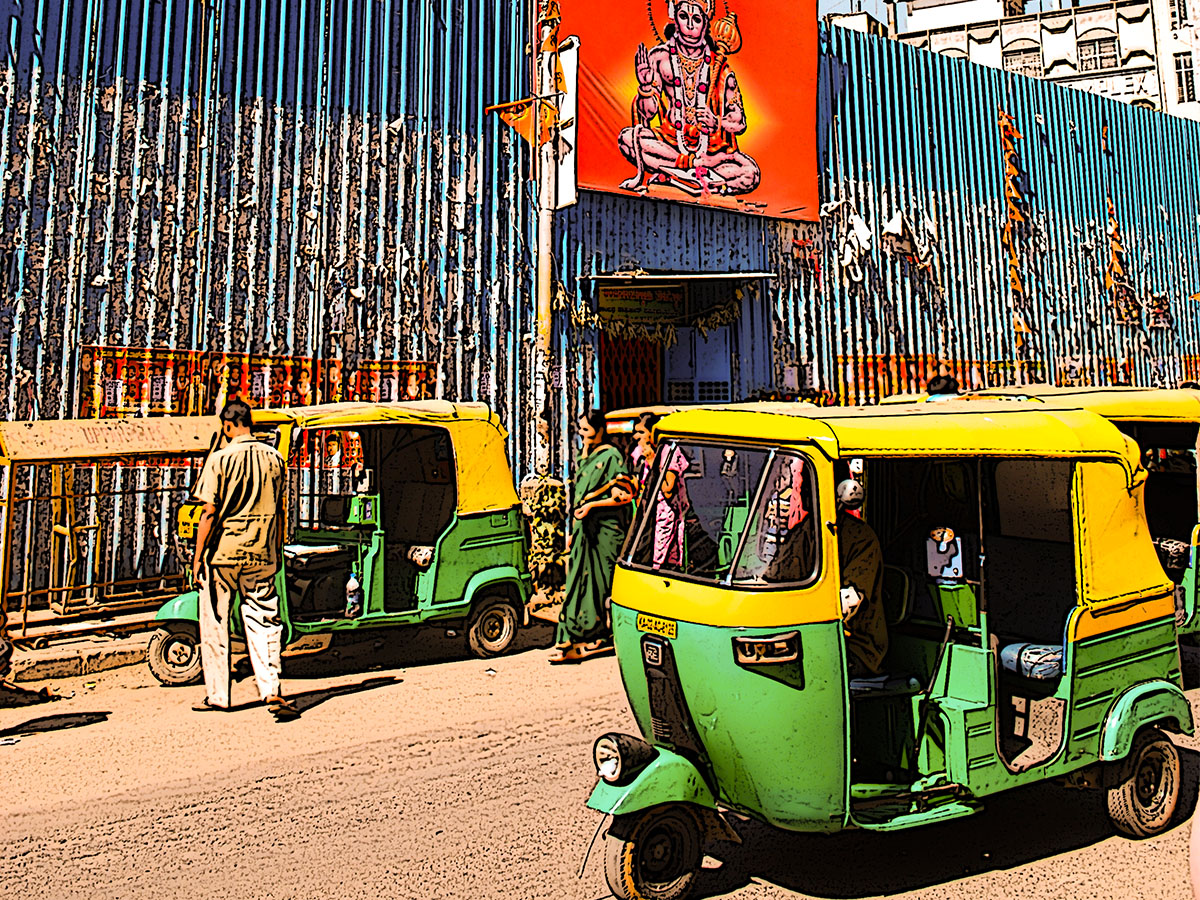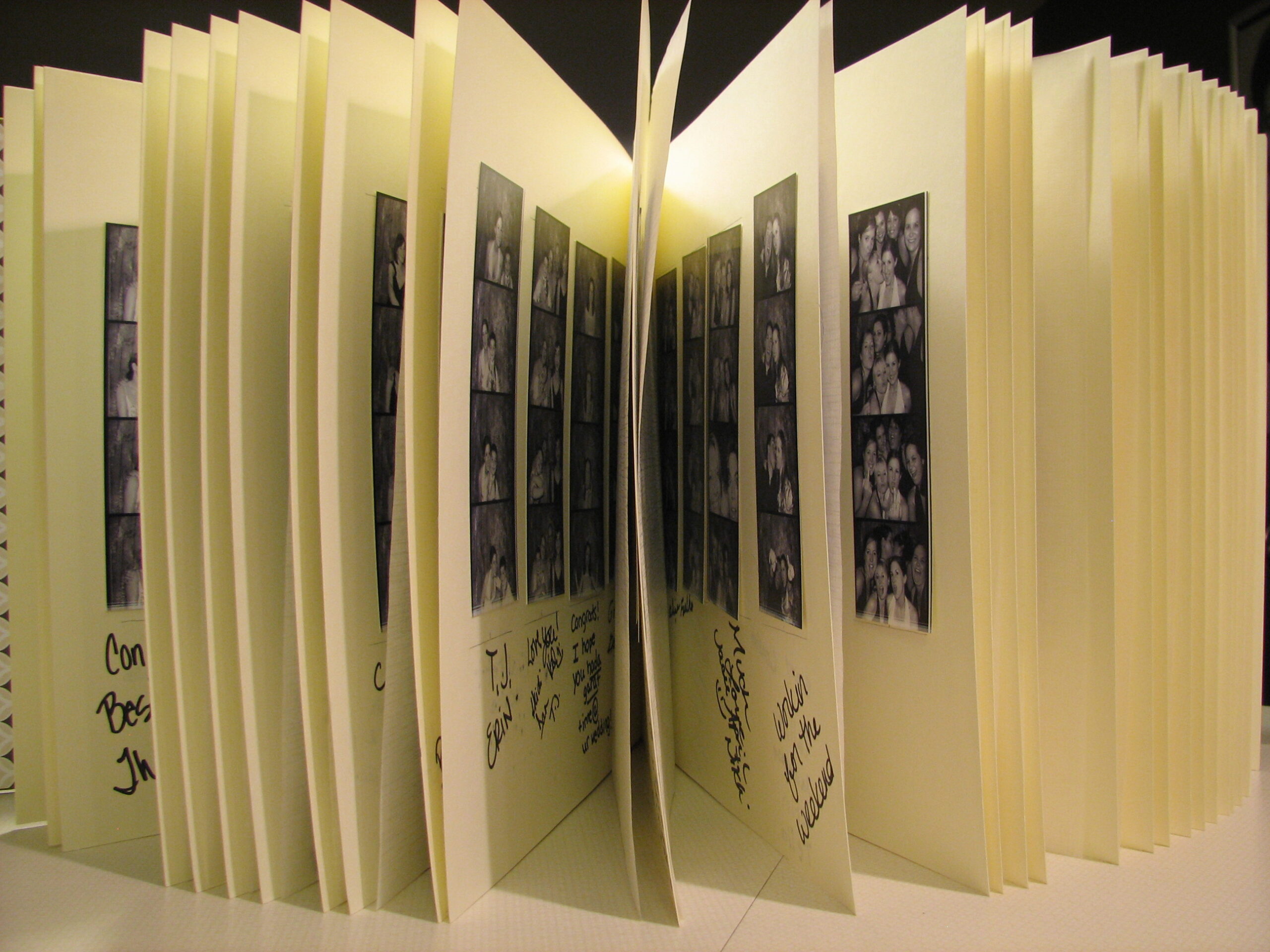I survey my painting of the snow-covered peak of Kanchenjunga. I’ll finish it this week. Gritting my teeth, I hustle into my blazer. Female faculty, but not male, must wear blazers. I fill my mind with thoughts of snow and grasp for grace to get through my day.
“Bye,” I call, rushing across the drawing-room.
“It looks like rain. Have you got your raincoat, Pragya?” Pa’s voice is muffled behind his PM-95 mask. He’s been searching for a book. His bookshelf is slightly dusty and his nose highly rhinitis-prone.
“Cross the roads very carefully,” Ma calls from the kitchen, pausing her breathing exercises. “Traffic is so crazy, these days anyone could just hit you and drive away.”
“Alright,” I mutter, shutting the front door. My shoes half-on, I hasten down the second-floor corridor. Sometimes my parents remember more dangers to warn me against, and call them out the door.
I stand at the corner hailing autorickshaws. Many are ferrying schoolchildren, plastic sacks full of produce, five-litre gas cylinders, or the drivers’ wives holding stacked egg-trays bound for grocers’. Ola and Uber now dominate the market, with prices so low that I wonder how they pay for fuel, never mind service. To make ends meet, autorickshaw drivers who’re not online moonlight as tiny delivery-vans. But some drivers still can’t be bothered: three empty autos pass me by, refusing to go so short a distance. They’re still living in the pre-globalised Bangalore of extortionist autorickshaw prices.
Under my blazer, sweat prickles my neck. I’ve got my raincoat alright, but the rain’s been holding off and it’s phenomenally muggy. There was a powercut, and neither the flat-complex’s generator nor our private inverter powers the AC: I’ve barely slept. My temper rises with my temperature. ‘Cross carefully’ – as if I were a child!
I thought it’d be nice to move back home, far from the midcity bustle, but my parents are too much. It’s alright for them to coddle themselves: with late breakfasts of whole wheat toast with smidgens of jam or butter, socks and mufflers if the temperature dips below 25°C, and a dust-mask habit far predating Covid. But I need to get away from this bourgeois mollycoddling. I need a little risk and new scenes to paint.
At university it’s business-as-usual. When I began my teaching career in December, my colleagues advised me to enforce strict discipline: phones facedown on the desk, laptops shut, pin-drop silence. But fresh from my PhD, and no fan of sitting still and listening myself, I gave my students leeway. I dreamed of demonstrating the effectiveness of democratic classrooms. Six months in, the whole back half of this class of ninety 18-year-olds spends all hour chattering. The students at the front, straining to hear, glance reproachfully over their shoulders at their football-hooligan classmates.
I whine a plea for silence, leavened with a smile. The noise ebbs briefly before deafening me afresh. I stumble through the hour anyhow: I figure it’s my job to teach and theirs to listen. I pity these young people, away for the first time from cloistering parents and martinet teachers, overburdened with academics and extracurriculars. And sometimes, a tiny bit, I want to murder them.
I’ve got to find another job.
After classes, unable to work, waiting for signout time, I try to nap in my cabin. I’m exuding heat from every pore. The heat churns my lunch in my stomach.
These days even a cart-pushing vegetable-vendor accepts Google Pay, even for tiny sums, but the autorickshaw driver I approach to drive me home is elderly, so I ask whether he accepts online payment. He shakes his head.
“Then d’you have change for Rs.100?”
He nods.
He wants Rs.70; I tell him I pay Rs.60 every day, up from Rs.50 since the Ukraine war began. He nods at the backseat; we set off. Elderly drivers drive slower. Maybe it’s because they can’t see the road too well; maybe it’s because they’ve seen too much.
I study him in the rearview. His skin is grayish under his grizzled beard and his gray eyes are restless. He looks like he lives on tea and cigarettes. His khaki uniform is mottled gray-brown. He scratches his chin with his inch-long index fingernail. I’ve watched television: I know what one long fingernail means. I wonder what he wanted to be when he was a child. I look away.
It’s the peak of monsoon but the lake shows not a sliver of water: it’s covered with water hyacinth. I wonder if the people who built these little, odd-shaped, too-bright houses knew that in ten years the lake would be dry, ringed by towering condo complexes, stinking with rubbish, covered with weeds, and patrolled by Nike-clad joggers as numerous and uniform as ants. I look away.
On my phone I scroll through Google Images photos of Kanchenjunga. I’m basing my painting on my own photos from midwinter, but it helps to have different views. Kanchenjunga still looks as though human beings never existed.
“If you don’t have change, sir,” I say as we pass the streetful of shops, “We can get it here.”
I call everyone ‘sir’ – it’s nice to be polite. They don’t always call you ‘madam,’ but that’s ignorance rather than rudeness. The younger drivers, who know smidgens of English, are more polite: but they drive down the narrow high-traffic streets like motorsport racers in a walled-off arena. I’ll take grouchy over daredevil.
“I have change,” the autorickshaw driver mutters.
I stop him at the private street leading to the flat-complex’s gate. I never make drivers go all the way. I produce my Rs.100. He produces Rs.20. I wait for him to produce Rs.20 more. He pats his breast-pocket perfunctorily, then shrugs.
“Sir, you said you had change.” I’m speaking Hindi, though I’m only fluent in English. His Hindi is broken too: his first language is probably Kannada or Tamil. He shrugs again, as if I’d asked him for a pen, holds out his Rs.20, and beckons for my Rs.100.
Is he dishonest, or atrocious at arithmetic? “I’m paying Rs.60, not Rs.80. Please give me Rs.20 more,” I enunciate. Perhaps he’s just senile.
“How can I give if I don’t have?” he shouts.
I purse my lips and shake my head. I find Rs.50 in my purse and offer him that: Rs.50 is closer than Rs.80 to the fare we agreed on. He glares as if I’ve blasphemed Brahma. “You’re cheating me!” he cries. “You pay full money.”
“I’m trying to pay full money,” I enunciate. “I told you we could stop for change.”
“What stop for change, where would we have stopped?” His gray eyes blaze and his thin tanned arms wave as he gesticulates.
“At any of the shops.” He’s in the wrong, and I long to thrust the Rs.50 into his hand and walk away, but that would put me in the wrong. “If you’d stopped anywh” –
“What shops? What shops would give change? Nobody gives change.” He jerks his hand, fingers taut, signifying ‘nothing doing.’
“What! I get change from shops all the time.” So do autorickshaw drivers: I see them all the time. “You didn’t even check if” –
“What check?” he shouts. “You’re supposed to pay. You pay!” He gestures again at my Rs.100 note. I put it back in my wallet. He goes into a frenzy. “You pay! I brought you all the way here!”
Suddenly I’m tired of being interrupted and bullshitted and lied to and I shout with all my might, my voice instantly breaking, “What ‘all the way’? It’s three kilometres and you’re already overcharging. I wanted to Google Pay you, everyone accepts online payment now, but you don’t. Fine. I asked you before I got on if you had change for Rs.100, and you said yes. Fine. I said we could stop for change at the shops, and you said no need. Fine! Now you want me to pay Rs.80 when we agreed on Rs.60. You take this” – I hold out the Rs.50 – “Or you get nothing.”
My ears blaze. My fists tense for contact with his grizzled cheek. I’m radiating heat like Vesuvius ready to blow the world apart. I’ve been working on anger management: it’s been years since I had a good rage.
The autorickshaw driver recoils. “You’re crazy,” he mutters. I stride away up the private street towards the front gate. “You’re mad!” I’m too furious to reply. He follows me, driving a foot behind. I stride ahead, swallowing my fear. What’ll he do: run me over at 5km/hour in this rickety vehicle? Engage me in fisticuffs? I go to the gym: I’ll lay his rickety ass out flat. He follows me to the gate, shouting, “You’re mad.”
I enter. I hear the security guard stopping him. Relief floods me: I’m safe from this madman now. If he’d been civil, I would’ve borrowed Rs.10 from the security guard – but now screw him. He stands shouting beside his auto. I avoid the stares of the security guards, washerman, and housekeeping staff. Let him shout. Calling people mad is the only relief for people like that: a hollow, carnival relief.
I take the steps two at a time, trembling with anger. I mumble greetings to my parents, who’re lounging over their late lunch, watching the news, bad news all day. I shut myself in my room and turn on the AC. The heat recedes from my mind, freeing it to think. I picture the old ass standing there making a scene. The security guards might ring us. That wouldn’t be nice.
I replenish my wallet and stride downstairs. The autorickshaw driver stands silently at the gate, arms folded. The security guard watches as I hand over Rs.60 without a word or look. The driver takes it silently. I climb back one step at a time and shut myself in again. My anger has vapourised my tiredness. That fool did me a favour! Without him I would’ve needed a nap; now I’m wide-awake. I take another bath and lie bareskinned on the cool floor. Relief floods me. When I’m feeling human again I work on my Kanchenjunga painting.
My parents and I visited the Himalayas last winter. They took a car all the way: a chaperoned, slow-paced, swaddled affair. Our final two days I left them to their hot tea and multiple mufflers and local friends, walked up the foothills, and stood studying Kanchenjunga’s snow-covered peak. I’m doing it in oils from a composite of two photographs: one of the snow at sunset, dyed a hundred oranges; another of an eagle flying just before me, blocking half the mountain. I focus on the texture of the snow.
The day’s heat retreats beyond my closed windows. I go say hello to my parents.
Ma’s watching the news while doing her Sudoku. She looks up; I stroke her gray hair; we chat about our day. Today’s Sudoku is moderately difficult: three out of five stars are filled in. On the coffee table where Ma rests her legs sits a paper-clipped pile of Sudokus, snipped from many editions of The Hindu. Over the course of the day, in between watching the news and reading it, she revisits old Sudokus and fills in the occasional digit. She tried to teach me once, telling me Sudoku builds patience; I muffled my yawns and offered to get her a Sudoku app; she declined to have any more apps: WhatsApp was enough. I watch her studying today’s Sudoku, resting her pen on the square she wants to solve. Often she can’t, and the pen leaves a dot marking her failure. But she never gives up. Her pile of puzzles, filled in in red, black, and blue, grows thick.
Ma had to quit her PhD midway when Pa got transferred. And then I was born and then my brother. Decades later, she’s begun doing Sudoku to sharpen her mind. Her head is bent as in prayer, her eyes are quiet, and her pen awaits divine inspiration. The life Ma has built herself, or anyway has accepted, consists of household chores, 24/7 news channels, and cooking shows. Her red velvet diary is full of recipes she’s never cooked.
As I watch, her pen doesn’t move at all. Perhaps the mind refuses to be sharper than it needs to be. I stroke her head and stroll away.
Pa’s in the bathroom on his after-lunch long visit to the ‘temple.’ Pa calls himself an aggressive atheist in a nation mired in superstition and groupthink. But this scatological nomenclature for number two is the extent of his aggressiveness. I knock and tell Pa I enjoyed his latest article on The Wire.
“Thanks, Pragya.” Through the door Pa tells me about his latest admirer: a professor at Salamanca University who read Pa’s retrospective last month on Goya. A college communist, Pa spent forty years working for a bank; now that he’s retired, he’s pursuing his vocation as a cultural commentator. But forty years of abusing antacids have caught up with him: he splits his time between his laptop and his ‘temple.’
Dicing vegetables for dinner, my mind turns from Kanchenjunga’s tranquillity to this afternoon’s incident. It seems far away, as a mountain does unless you’re on it, and sometimes even then. As I strode upstairs, I worried the driver might resume his shouting match, or knock me over, when we crossed paths in the neighbourhood later. But I’m as safe in here, and going out from here, as if I were up on Kanchenjunga.
Waiting for the oil to heat up I gaze out the window. He’s an old man ferrying strangers all day: he must’ve forgotten he didn’t have enough change, felt too sullen to check, and then felt too terrified of losing Rs.10 to confess his error. Poor old man. You were furious because you knew you were wrong. I forgive you.
But I don’t regret shouting. If you’re always softspoken, people exploit you. As I add methi and saunf seeds to the oil, I make up my mind to do what I’ve been shilly-shallying about.
From tomorrow I’ll enforce discipline. Any student who chatters persistently will lose their attendance. Marks and attendance are the only language the back half speaks. I’ve tried speaking my language; now I’ll speak theirs. My colleagues tell me I have authority in my classroom. Why have I resisted exercising it?
I stir-fry the eggplant and bell peppers, wondering if the driver too has got over this afternoon. Has he got a painting to finish, memories of travel to relish, the season’s best vegetables to fry up? And my job is, after all, quite nice – a cosy cabin, and young people calling me ‘ma’am’ all day. Probably the autorickshaw driver is still longing to kill me, battering his wife instead, his wife who’s even frailer than him. Too many people share his shack: nobody has a room of their own to get away to. He will not forgive me so easily and it doesn’t matter.
I sniff the roasting eggplant. Outside the kitchen window the blazing sky darkens with thunderclouds. I bring in the clothes drying on the balcony and settle down to watch the downpour.
Amita Basu is a cognitive science PhD candidate. Her fiction has appeared/is forthcoming in Silver Pen Fabula Argentea, Flash Fiction Magazine, Gasher, Fearsome Critters, Kelp, Potato Soup Journal, Star 82 Review, Dove Tales, St. Katherine Review, Novel Noctule, Entropy, Proem, The Bookends Review, Muse India, Scarlet Leaf Review, and The Right-Eyed Deer. Her nonfiction has appeared in The Curious Reader, Deccan Herald, Qrius, Countercurrents, and ParentEdge. She’s working on a collection of short stories about women’s lives in India, and a medical/legal mystery novel about art. She lives in Bangalore, India. Her published writing is at amitabasu.wordpress.com.
Image Credit: Cerid Jones





2 thoughts on “Retreat by Amita Basu”